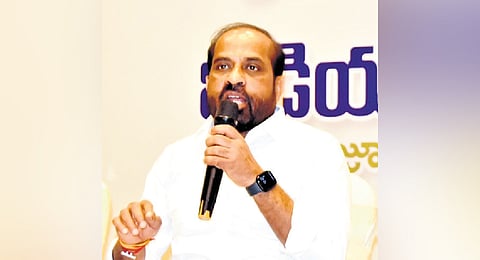Andhra Pradesh to get four new medical colleges under PPP model, says Health Minister Satya Kumar Yadav
VIJAYAWADA: Health, Family Welfare and Medical Education Minister Y Satya Kumar Yadav on Saturday announced that Andhra Pradesh will soon have four new medical colleges under the Public-Private Partnership (PPP) model starting this academic year.
Addressing a press conference in Vijayawada to mark the NDA government’s first year in office, the health minister outlined major health sector achievements, pointed to systemic failures of the previous regime, and laid out a future vision to transform public healthcare in the State.
“The rationale behind the establishment of 10 new medical colleges under the PPP mode is purely a consequence of the previous government’s legacy,” Satya Kumar Yadav said, adding that the State government is now prepared to implement reforms with accountability and transparency.
Highlighting performance-based achievements, the minister said Andhra Pradesh received a Rs 100 crore performance incentive under the National Health Mission (NHM) a first for the State. Under the Ayushman Arogya Mandirs (AAMs) initiative, the State began construction of 3,318 new buildings with Rs 1,065 crore in central assistance in just one year, compared to 6,000 structures completed in five years earlier.
He said that 10 new Critical Care Blocks (CCBs), each costing Rs 25 crore, were sanctioned this year. Of the Rs 1,280 crore allocated previously, only Rs 28 crore had been spent by the previous YSRCP regime. The current administration has already spent Rs 62 crore and plans to operationalise five CCBs by the end of the month.
Diagnostic infrastructure has also seen a significant upgrade. Thirteen Integrated Public Health Labs (IPHLs) were sanctioned, matching the previous five-year tally. City Diagnostic Centres (CDCs) in Vijayawada, Visakhapatnam and Tirupati are being made operational.
More than 3,200 diagnostic machines have been procured, and doorstep diagnostic testing is set to begin through 104 mobile units, starting with a pilot of 34 vehicles.
Cath labs at Ongole and Kadapa are now functional. Six additional CT scanners and three more cath labs have been sanctioned. The Kurnool Cancer Hospital is fully operational with four advanced Linac machines for cancer treatment.
To strengthen digital health infrastructure, the State government will establish a Digital Health Command and Care Centre in collaboration with the Gates Foundation. A pilot Digital Nerve Centre is also being developed with Tata Trusts in Kuppam, serving 3.3 lakh people. These centres will enhance telemedicine, digital diagnostics, and AI-based patient monitoring.
In terms of preventive care, the minister noted that the NCD 3.0 (Non-communicable Diseases) campaign for cancer and other diseases screening has covered 2.71 crore people, 66% of the adult population. The STEMI (ST-Elevation Myocardial Infarction) programme has saved 2,650 lives by providing injections worth Rs 45,000 each free of cost to prevent heart attacks. Under the Rashtriya Bal Swasthya Karyakram (RBSK), 58 lakh out of 69 lakh schoolchildren were screened.
Stricter monitoring has led to a 14.2% rise in doctor and staff attendance. Public satisfaction improved, with corruption complaints dropping from over 60% to 41%.
Minister Satya Kumar Yadav criticised the previous government for failing to implement announced initiatives. Of the 17 proposed medical colleges, only five were operational, and just 14% of the sanctioned Rs 8,400 crore was spent.

